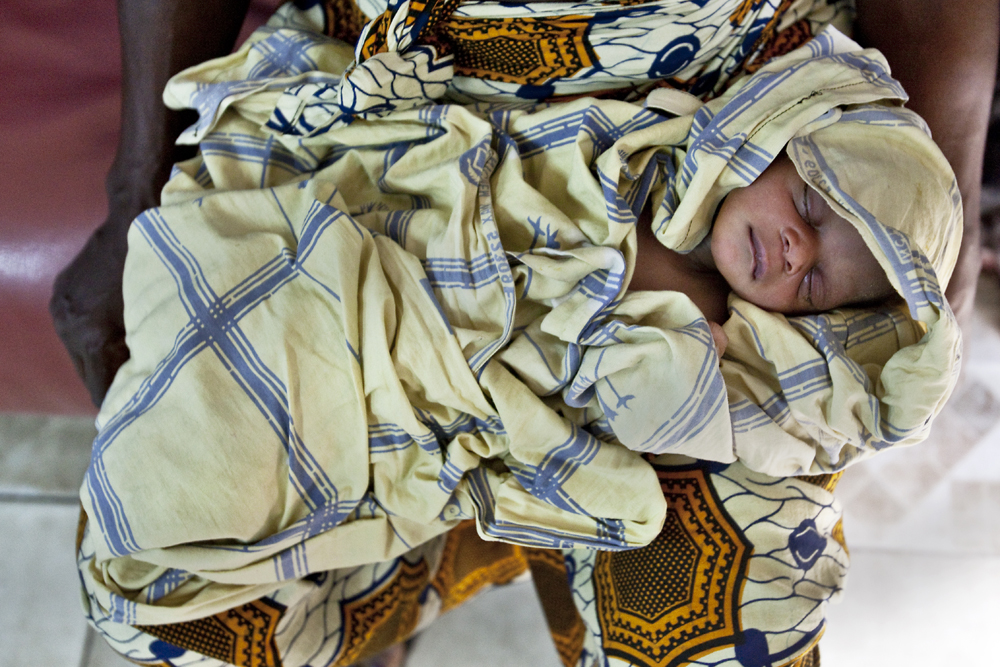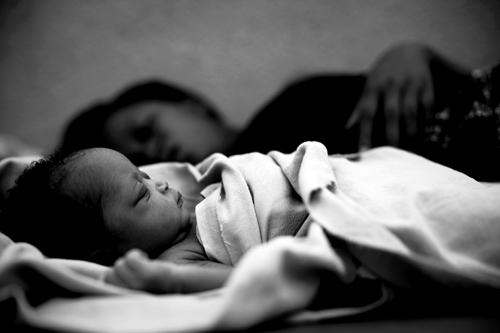
Melinda Gates has me thinking about the time I became a mother. When the Gates Foundation co-chair recently said that improving family planning for the global poor is her new personal mission -- and that she is making it a top priority for the world's biggest public health philanthropy -- it immediately brought me back to my own experience giving birth to my son 20 years ago. Back then, the thing I needed most was not family planning, but a well-trained midwife.
I was 18, an unwed and pregnant young woman about to have her first baby in the midst of Liberia's civil war. Just weeks before I went into labor, a rebel group took control of my town, a suburb of the capital, Monrovia. Anyone who could run away did, including all doctors and nurses. I had no choice but to find a traditional midwife and ask her to help me have my baby.
I walked for an hour or more to a remote village. The path was narrow, and thorns grabbed my legs from the bushes. I was already in labor -- and in pain -- by the time we reached the home of an elderly woman whom my baby's father knew. I lay on the floor of her hut waiting for the baby to come. That night, it was raining cats and dogs, and the rebels were shooting. Just after the gunshots began, my son came. He was small, but healthy.
But then, the afterbirth was stuck. I was confused. I thought that with the baby already out the ordeal would be over, yet I writhed in pain. The old woman helping me knew little more than I did -- only what she had learned from her own mother. That included a belief that the afterbirth was stuck because I had sinned. She accused me of adultery and demanded that I confess the name of my lover. As I bled, she beat my legs.
Finally, I pulled a name out of the air and offered it to her. In an adjacent room, a man knocked some old cups together. He said he was consulting the gods of our ancestors and that they would allow me to live because I had confessed the name. The midwife gave me a teaspoon of kerosene because she believed it would help finish the birth, and I passed out before I had the chance to hold my first child. But I survived.
Other young girls were not so lucky. Even today, nearly a decade after the end of the civil war, and in Africa's first country with a female president, Liberia has the world's 10th-highest maternal mortality rate. Health clinics and hospitals are few and far between. On average, the World Health Organization reported in 2010, Liberia has only three nurses or midwives and less than one doctor for every 10,000 people. Bad roads make it difficult for most of us to access what medical resources there are.
Like all numbers, these only tell part of the story. These numbers in particular were collected over a nine-year period -- a period that in my country represents the end of the civil war and the beginning of recovery. It's difficult to overstate how many things war destroyed here and how much we've had to recover from.
But Liberia is making progress. This year, for example, newly reelected President Ellen Johnson Sirleaf has made increasing the number of competent birth attendants a priority for her second term. That means that most rural villages and towns rely on traditional birth attendants who practice home deliveries -- with habits handed down from their mothers and grandmothers. Some still use folk cures, like herbal concoctions, and the delivery fee they earn from each pregnant woman's family makes them reluctant to refer their clients to modern medical clinics.
This is where women like Miatta Abraham come in. I met Abraham in March, when I was interviewing newly trained traditional midwives, or TTMs. I was writing a piece for Front Page Africa, an investigative paper, on what maternal health in Liberia looks like 20 years after my own traumatic experience.
TTMs are an integral part of the country's strategy for reducing maternal deaths. Supported by international donors, the Liberian government so far has trained 6,000 TTMs to improve their delivery skills, offer basic prenatal care, and recognize early danger signs in pregnant women that might necessitate a transfer to medical clinics before complicated labor begins. Abraham, 38 years old, lives in a village in Todee district on the rural outskirts of Monrovia. "[In] some of the villages, there is no car road," she told me, "so people tote [the pregnant woman] in a hammock" to reach a clinic in a time of crisis.
Even in the face of complications, rural Liberian women often don't want to make the arduous trek through the bush, says Abraham. Instead, they would prefer to pay a village midwife $20 to deliver the child at home. Abraham thinks that this financial incentive, still in place from the old system, makes it harder for newly trained TTMs to convince families to move at-risk pregnant women into clinics before difficult births. TTMs are unpaid, like many of the jobs that support Liberian health services, which means that trained volunteers like Abraham often have less clout in villages and are considered less professional than the untrained women who still receive money from families.
But training and pay aren't the obstacles preventing reform of the country's birthing system. John Flomo, the officer in charge at the Todee District Clinic, says that what happened to me the first time I gave birth is still happening today. "Many of these midwives, before their training, were still practicing the method of forcing pregnant women to confess to having outside affairs before the baby would come," he told me. The hope is that providing formal training for midwives will help make delivery a matter of science, not superstition.
Of course, as Gates notes, one of the most effective strategies for reducing maternal deaths would be to reduce the number of unplanned pregnancies, which the United Nations expects to approach 300 million worldwide in the next decade. Improving access to contraceptives can help those women. A 2011 World Health Organization study stated that only 11 percent of women in Liberia are using modern contraceptive methods -- for all of sub-Saharan Africa, the rate is nearly three times as high. Today in Liberia, 35 percent of women have family planning needs that aren't met.
But there's also a lesson in what happened to me two decades ago. Pregnancies, accidental or planned, should be supported by effective health systems. Women have many reproductive rights, and one of those should be giving birth safely. As the international donor community shifts its focus to helping women who don't want to be mothers, I hope we won't forget the ones who do.
Mae Azango is an award-winning human rights journalist working for Front Page Africa and New Narratives in Monrovia, Liberia. Her work on female genital mutilation, for which she received death threats this year, helped bring an official end to the practice in Liberia. Her recent work on midwives was supported by the Pulitzer Center on Crisis Reporting.






